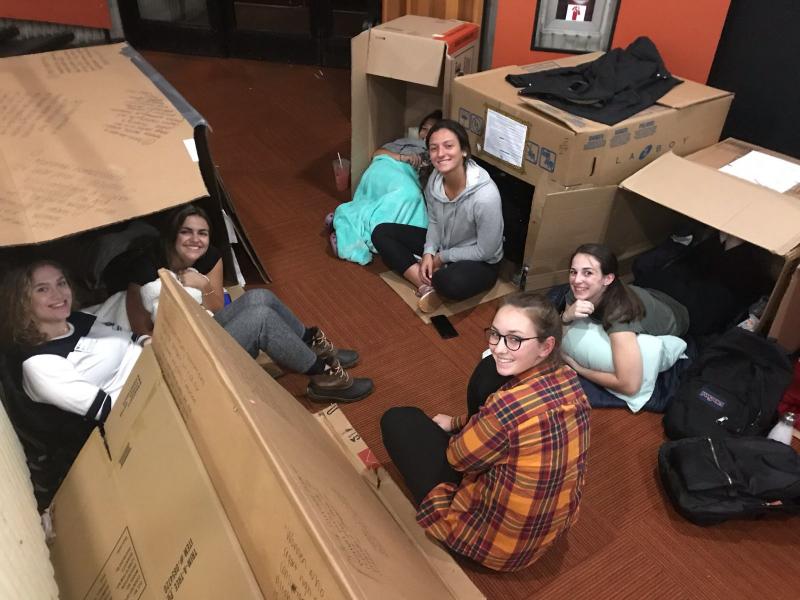Students use cardboard box village to raise awareness about homelessness
Matthew Machado traded the comfort of his UMass Dartmouth dorm room for more rugged accommodations: A cardboard box.
The senior nursing student was one of more than 100 students who took part in the “Cardboard Box Village” program to raise awareness about homelessness. Students camped out overnight from September 26 to 27 to experience firsthand the struggles of those without a home.
“It’s about people understanding and getting a glimpse at what homelessness looks like,” said Maryellen Brisbois, a community nursing professor who organized the program.
Machado took the project seriously, showing up to the campout with his cardboard box, a few essentials, and snacks. He intentionally brought less than what was recommended.
“For me, I brought the bare minimum and what was exactly assigned,” Machado said. “I brought just my box, a little snack, didn’t bring a lot of food, and a jacket because I thought it was going to rain.”
Roughing it was a challenge, as comfort was nonexistent, but it helped Machado connect with the struggles homeless people endure.
“I embraced the uncomfortableness and being hungry and sleeping uncomfortably,” Machado said. “In a cardboard box, it was not like I was sleeping with a blanket and pillow. It really hit me.”
Although the campout did not go exactly as expected — students had to move indoors when severe thunderstorms were predicted — it still provided a learning experience.
“Students did make the best of the experience,” Brisbois said. “They thought about if they were in the elements for real, what would they have done?”
Amanda Feno also carefully prepared to be unprepared for the project. She selected a box that was just large enough to sleep in, but she did splurge for a pillow -- considered a luxury item.
“I just made sure I had relatively warm clothing,” Feno said. “You can’t take everything with you, and I wanted it to be as realistic as possible too, to get the most out of the experience I could.”
Each student researched statistics to write on their cardboard box to reflect the impact homelessness has on a range of health concentrations, from pediatrics to community health. But data can be lacking, as students discovered.
“I thought it would be easy to find accurate statistics but it was a lot more challenging than I thought,” Feno said. “Most available sources were from the early 2000s, and there was not a plethora of information from 2016, 2017, or 2018.”
One powerful statistic she did discover about pediatrics, is that one in 27 children under the age of 6 experience homelessness.
“I thought that was a big number,” Feno said.
Machado discovered homelessness is a problem even in Massachusetts, where public schools identified 21,112 students experiencing homelessness in the 2016-2017 academic year.
Although not intended as a donation drive, students also raised donations for Arnie’s Cupboard, an on-campus food pantry serving students struggling with food insecurity. The nursing students also hosted a public event to guide visitors through the village and shared the statistics they collected.














